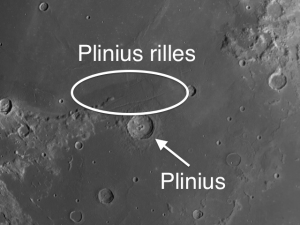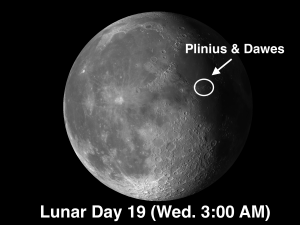The week of June 12-18 takes us from lunar Day 18 to the end of Day 23. This week we will highlight the craters Plinius and Dawes, visible early Wednesday morning around 3:00 AM.
Plinius: [NE/H12] Standing sentinel between the seas of Tranquillity and Serenity is the crater Plinius, a fine object with a sharp rim, terraces, an ejecta blanket, and a central projection which, depending on the illumination, has been described variously as a mountain, a double-mountain, central craters, or low mounds. How does it strike you?
 Immediately to the north of Plinius are three prominent rilles (Rimae Plinius), which follow along the edge of the Serenity basin. The lava that filled Serenity was so heavy that it not only affected Posidonius and le Monnier (as described in the March 27, 2016 blog) but substantial cracks opened up near Plinius, over 200 miles away.
Immediately to the north of Plinius are three prominent rilles (Rimae Plinius), which follow along the edge of the Serenity basin. The lava that filled Serenity was so heavy that it not only affected Posidonius and le Monnier (as described in the March 27, 2016 blog) but substantial cracks opened up near Plinius, over 200 miles away.
Although the lavas covering Serenity have a brighter hue, can you see that the lava plains of Mare Tranquillitatis are darker and older? The coloring becomes suddenly lighter just north of Plinius.
Dawes: [NE/H12] Positioned in the straits between Tranquillity and Serenity is the small 11-mile crater Dawes. Some observers say it has a small central peak, others do not. What do you think?
======================
It is highly recommended that you get a copy of Sky and Telescope’s Field Map of the Moon, the very finest Moon map available for use at the telescope. It is available for $10.95 at www.skyandtelescope.com and on Amazon. All features mentioned in this blog will be keyed to the grid on the Field Map and will look like this: Plato: [NW/D9]
Credits:
Courtesy of Gray Photography of Corpus Christi, Texas
Lunar photos: NASA / USGS / BMDO / LROC / ASU / DLR / LOLA / Moon Globe. Used by permission
- Rupes Cauchy: A Best Known Fault on the Moon - July 22, 2024
- Moon Crater Schickard – Crater Floor has Stripes - July 15, 2024
- Moon Craters Langrenus and Vandelinus - July 8, 2024
